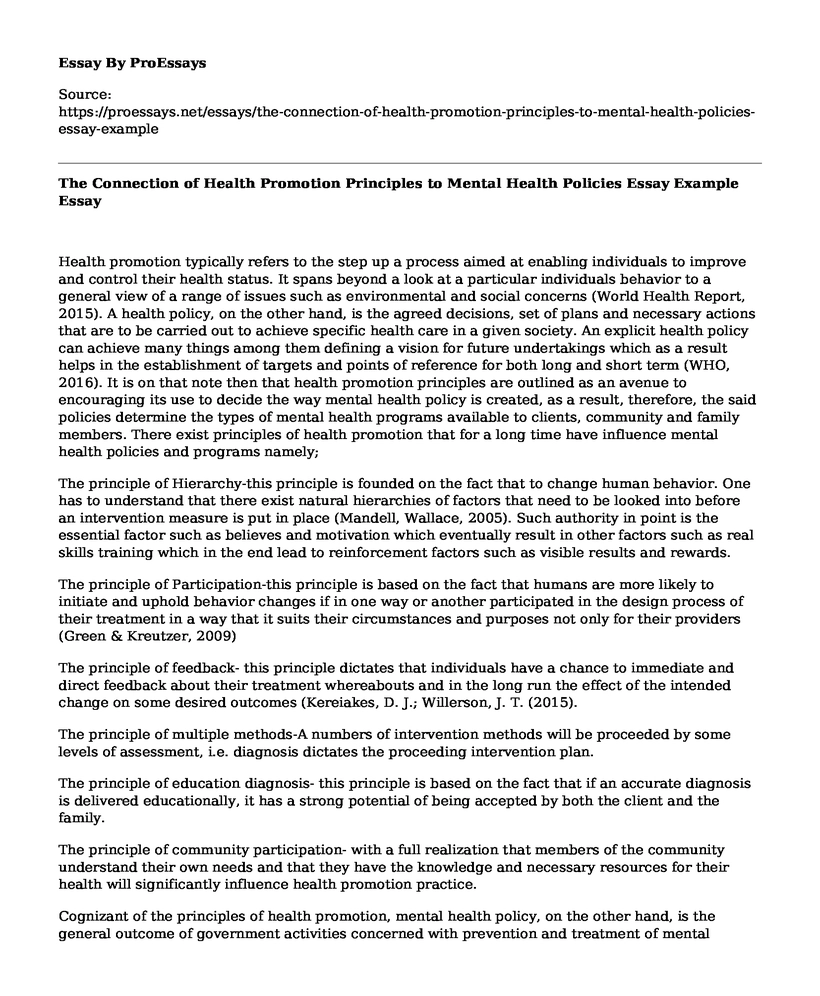Health promotion typically refers to the step up a process aimed at enabling individuals to improve and control their health status. It spans beyond a look at a particular individuals behavior to a general view of a range of issues such as environmental and social concerns (World Health Report, 2015). A health policy, on the other hand, is the agreed decisions, set of plans and necessary actions that are to be carried out to achieve specific health care in a given society. An explicit health policy can achieve many things among them defining a vision for future undertakings which as a result helps in the establishment of targets and points of reference for both long and short term (WHO, 2016). It is on that note then that health promotion principles are outlined as an avenue to encouraging its use to decide the way mental health policy is created, as a result, therefore, the said policies determine the types of mental health programs available to clients, community and family members. There exist principles of health promotion that for a long time have influence mental health policies and programs namely;
The principle of Hierarchy-this principle is founded on the fact that to change human behavior. One has to understand that there exist natural hierarchies of factors that need to be looked into before an intervention measure is put in place (Mandell, Wallace, 2005). Such authority in point is the essential factor such as believes and motivation which eventually result in other factors such as real skills training which in the end lead to reinforcement factors such as visible results and rewards.
The principle of Participation-this principle is based on the fact that humans are more likely to initiate and uphold behavior changes if in one way or another participated in the design process of their treatment in a way that it suits their circumstances and purposes not only for their providers (Green & Kreutzer, 2009)
The principle of feedback- this principle dictates that individuals have a chance to immediate and direct feedback about their treatment whereabouts and in the long run the effect of the intended change on some desired outcomes (Kereiakes, D. J.; Willerson, J. T. (2015).
The principle of multiple methods-A numbers of intervention methods will be proceeded by some levels of assessment, i.e. diagnosis dictates the proceeding intervention plan.
The principle of education diagnosis- this principle is based on the fact that if an accurate diagnosis is delivered educationally, it has a strong potential of being accepted by both the client and the family.
The principle of community participation- with a full realization that members of the community understand their own needs and that they have the knowledge and necessary resources for their health will significantly influence health promotion practice.
Cognizant of the principles of health promotion, mental health policy, on the other hand, is the general outcome of government activities concerned with prevention and treatment of mental disorders the situation of people living with mental illness and public events that promote healthy lifestyles (Kickbusch, I. (2011).
Conclusion
In conclusion it is imperative that integration is established between health promotion principles with mental health policies. The full realization of this integration calls for a collective contribution by all the stakeholders (Navarro, 2017). The implementation of this will be realized if for instance there exists advocacy from the national level to ensure that the policies are put in place and its application is at its full swing. Also notable is the equation of policymakers to ensure that they hold the right know-how about the policies in place which in turn will lead to a great implementation and the realization of the health policy. This structured advocacy should run down to states down to an individual level.
Reference
Kereiakes, D. J.; Willerson, J. T. (2015). Prevalence and Treatment of Mental Disorders. Endland Journal of Medicine
The world health report (2015), Mental Health: New Understanding, New Hope
World Health Organization, (2016), Mental Health Policy
Mandell, Wallace, (2005), Origins of Mental Health, The Realization of an idea. Johns Hopkins Bloomberg School of public Health.
Barker, Phil (2018).Mental Health Ethics: The Human Context. Routledge.p.146
Power, A (2017). Transforming the Nation's Health: Next Steps in Mental Health Promotion. American Journal of Public Health.
Cite this page
The Connection of Health Promotion Principles to Mental Health Policies Essay Example. (2022, Nov 28). Retrieved from https://proessays.net/essays/the-connection-of-health-promotion-principles-to-mental-health-policies-essay-example
If you are the original author of this essay and no longer wish to have it published on the ProEssays website, please click below to request its removal:
- Psychology Essay: Using Piaget's Cognitive Development Theory in the I Am Sam Movie
- Paper Example on Skin Pressure Injuries
- Suicide Among College Students in America Essay Example
- Why People Behave the Way They Do? Essay Example
- Research Paper on Social Work Planning a Needs Assessment
- Essay Example on Drug Addiction: Diagnosis and Treatment
- Paper Sample on Elderly Home Care: Inpatient Education for Safety







